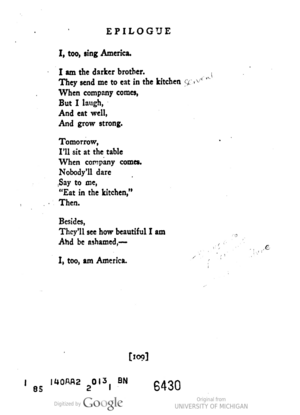|
I, Too "I, Too" is a poem written by Langston Hughes that shows a want for equality through patience whilst going against the idea that patriotism is limited by race. It was first published in Hughes' first volume of poetry, The Weary Blues in 1926. This poem, along with other works by Hughes, helped define the Harlem Renaissance, a period in the early 1920s and '30s of newfound cultural identity for blacks in America who had discovered the power of literature, art, music, and poetry as a means of personal and collective expression in the scope of civil rights.[1] In the poem, Hughes describes a ubiquitous racial oppression that degrades African Americans from their proper place. He writes from the perspective of the "darker brother" to a domineering family that shoos him away to the kitchen whenever company arrives. Hughes ties together the sense of the unity that U.S. President Abraham Lincoln spoke about regarding the separate and diverse parts of the American democracy (the coexistence of slavery and freedom) by referencing Walt Whitman's poem "I Hear America Singing".[2] Lines from this poem are engraved on the exterior walls of the National Museum of African American History and Culture in Washington, D.C.[2]
References
External linksWikisource has original text related to this article:
|